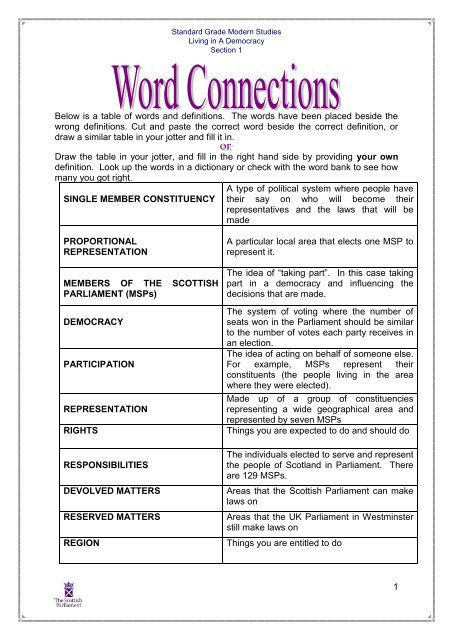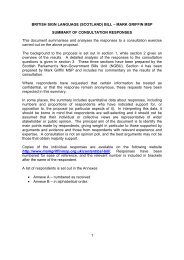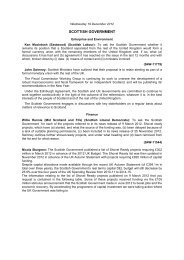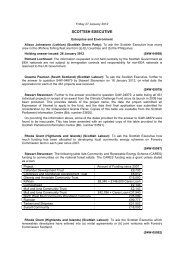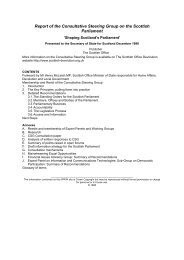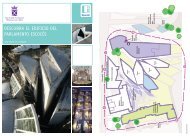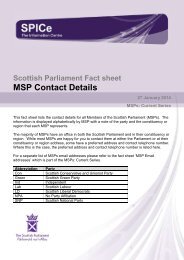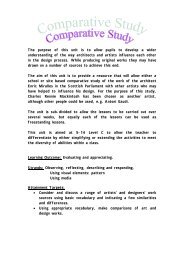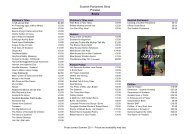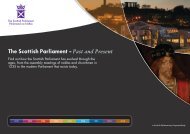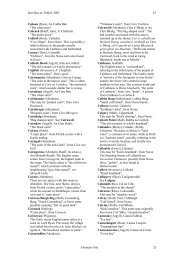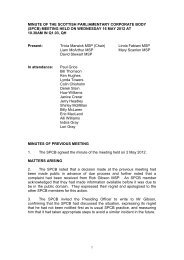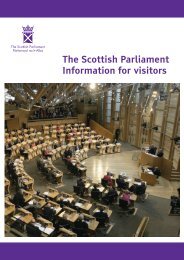WORD BANK - Scottish Parliament
WORD BANK - Scottish Parliament
WORD BANK - Scottish Parliament
Create successful ePaper yourself
Turn your PDF publications into a flip-book with our unique Google optimized e-Paper software.
Standard Grade Modern Studies<br />
Living in A Democracy<br />
Section 1<br />
Below is a table of words and definitions. The words have been placed beside the<br />
wrong definitions. Cut and paste the correct word beside the correct definition, or<br />
draw a similar table in your jotter and fill it in.<br />
Draw the table in your jotter, and fill in the right hand side by providing your own<br />
definition. Look up the words in a dictionary or check with the word bank to see how<br />
many you got right.<br />
A type of political system where people have<br />
SINGLE MEMBER CONSTITUENCY their say on who will become their<br />
representatives and the laws that will be<br />
made<br />
PROPORTIONAL<br />
REPRESENTATION<br />
MEMBERS OF THE SCOTTISH<br />
PARLIAMENT (MSPs)<br />
DEMOCRACY<br />
PARTICIPATION<br />
REPRESENTATION<br />
RIGHTS<br />
RESPONSIBILITIES<br />
DEVOLVED MATTERS<br />
RESERVED MATTERS<br />
REGION<br />
A particular local area that elects one MSP to<br />
represent it.<br />
The idea of “taking part”. In this case taking<br />
part in a democracy and influencing the<br />
decisions that are made.<br />
The system of voting where the number of<br />
seats won in the <strong>Parliament</strong> should be similar<br />
to the number of votes each party receives in<br />
an election.<br />
The idea of acting on behalf of someone else.<br />
For example, MSPs represent their<br />
constituents (the people living in the area<br />
where they were elected).<br />
Made up of a group of constituencies<br />
representing a wide geographical area and<br />
represented by seven MSPs<br />
Things you are expected to do and should do<br />
The individuals elected to serve and represent<br />
the people of Scotland in <strong>Parliament</strong>. There<br />
are 129 MSPs.<br />
Areas that the <strong>Scottish</strong> <strong>Parliament</strong> can make<br />
laws on<br />
Areas that the UK <strong>Parliament</strong> in Westminster<br />
still make laws on<br />
Things you are entitled to do<br />
1
Standard Grade Modern Studies<br />
Living in A Democracy<br />
Section 2<br />
Could you represent the people in your area?<br />
Are you good at debating?<br />
Can you make decisions on behalf of other people?<br />
Are you good at listening to different points of view?<br />
You could apply to your local political party or stand as an<br />
independent candidate and perhaps become a<br />
Selection of Candidates for the <strong>Scottish</strong> <strong>Parliament</strong><br />
The majority of people who want to be a representative in the <strong>Scottish</strong> <strong>Parliament</strong><br />
have to participate in a selection process. This is a bit like applying for a job. They<br />
may be interviewed, possibly have to give talks and answer questions about their<br />
ideas and what they want to do in the <strong>Parliament</strong>, in the constituency or region.<br />
Many will have to persuade the political party they belong to that they would make<br />
the best representative in the <strong>Parliament</strong> for the people in their area and that they<br />
would also be good party workers.<br />
The different political parties all have their own way of selecting candidates. This is<br />
how the main parties have selected their candidates in recent elections:<br />
1
The <strong>Scottish</strong> Labour Party<br />
In 1999, a Selection Board was made up of people from the UK and <strong>Scottish</strong><br />
sections of the Labour Party. They drew up a list of approved candidates.<br />
Labour wanted to achieve better elected representation of women in the <strong>Scottish</strong><br />
<strong>Parliament</strong> and therefore in their selection process they paired constituencies. Two<br />
constituencies were brought together as selection partners, working to choose the<br />
two best people, one a man and the other a woman, to be the Labour candidates for<br />
their constituencies.<br />
The <strong>Scottish</strong> Conservative and Unionist Party<br />
In 1999, the vetting of parliamentary candidates was carried out by a four-member<br />
Board appointed by the Party’s ruling body. The Board was independent of all other<br />
sections of the Party. It oversaw the fairness of selection procedures although<br />
candidates were selected by the Party’s members in each constituency.<br />
The <strong>Scottish</strong> Green Party<br />
The <strong>Scottish</strong> Green Party only fielded candidates in the regional lists. They held a<br />
postal ballot in the region, with the candidates being ranked in order of preference.<br />
There was also the chance to put a “negative vote” against the name of a candidate<br />
that was thought to be totally unsuitable.<br />
The <strong>Scottish</strong> Liberal Democratic Party<br />
The Liberal Democrats created a list of approved candidates from which local party<br />
sections were able to select the person who would represent them in the election.<br />
The Party at national level asked the local parties to be aware of the need to have<br />
more women in the <strong>Parliament</strong> but this was not made compulsory.<br />
The <strong>Scottish</strong> National Party<br />
The SNP had a list of approved candidates from which the local SNP constituency<br />
parties were able to nominate candidates. If there is more than one candidate<br />
nominated in the constituency all the members of the party in the area vote by Single<br />
Transferable Vote to select the candidate.<br />
PROSPECTIVE PARLIAMENTARY CANDIDATES<br />
The people who stand in the election hoping to be<br />
chosen as Members of the <strong>Scottish</strong> <strong>Parliament</strong> are<br />
known as Prospective <strong>Parliament</strong>ary Candidates.<br />
2
Most candidates belong to a political party and have been selected as the<br />
representative of that party. Once the party has chosen who they want as their<br />
candidate then that person will be given lots of support and help. For example,<br />
Shona Robison is a member of the <strong>Scottish</strong> National Party, and is a Member of the<br />
<strong>Scottish</strong> <strong>Parliament</strong>. How did she become an MSP?<br />
1. Shona joined the SNP when she was 22 years old.<br />
2. She persuaded the Party that she would make a good MSP and was put on<br />
the Regional list for North East Scotland at the 1999 elections. She was<br />
successfully elected for that region as an MSP.<br />
3. For the 2003, 2007 and 2011 elections, Shona was selected from SNP<br />
prospective candidates to be the candidate for the Dundee City East<br />
Constituency.<br />
4. The local party supported Shona in her election campaign<br />
5. Shona was successful in being elected as MSP for the Dundee City East<br />
constituency and is now their representative in the <strong>Scottish</strong> <strong>Parliament</strong>.<br />
Not all candidates will be members of a political party. Some people choose to stand<br />
as Independent Candidates. They must find support for their campaign from people<br />
who feel they would make a good representative for the area. If they are successful<br />
they can become an Independent MSP in the <strong>Scottish</strong> <strong>Parliament</strong>.<br />
In the 2011 elections there was one successful Independent candidate. This was<br />
Margo MacDonald who is now an MSP for the Lothians Region.<br />
Not all candidates who stand for election to the <strong>Parliament</strong> are successful. Indeed<br />
as there are only 129 seats in the <strong>Parliament</strong> the vast majority of candidates will be<br />
unsuccessful. They will have to wait for the next election before they compete for<br />
the opportunity to:<br />
1. Be selected by their political parties.<br />
2. Stand as a prospective parliamentary candidate.<br />
3. Try to persuade enough constituents to vote for them and become an MSP.<br />
3
Activities<br />
Knowledge and Understanding<br />
1. Describe in detail how at least two of the political parties selected prospective<br />
parliamentary candidates.<br />
2. Explain how the Labour Party sought to increase the number of female<br />
prospective parliamentary candidates.<br />
3. Using the case studies on page 3, explain the main difference between the<br />
election of Shona Robison MSP and an Independent MSP.<br />
4. ONLINE ACTIVITY:<br />
Find out who was successful at the <strong>Scottish</strong> <strong>Parliament</strong> elections in your<br />
constituency and region by going to the <strong>Scottish</strong> <strong>Parliament</strong>’s website<br />
www.scottish.parliament.uk click on the section MSPs and follow the instructions.<br />
Copy the following table into your jotter and fill in the details from the information you<br />
find. This activity can also be done as a group activity to produce a wall chart of your<br />
constituency, and regional MSPs who represent you. (You may want to add other<br />
information; such as the Committees they sit on, their addresses to write to them or<br />
any other interesting information.) What does your class feel is important to record<br />
about your MSPs?<br />
The name of my constituency is:<br />
The name of my constituency MSP is:<br />
THE CONSTITUENCY MSP<br />
The Political Party my constituency MSP belongs to is:<br />
The contact details for my constituency MSP are:<br />
<strong>Parliament</strong>:<br />
Constituency:<br />
Email:<br />
.msp@scottish.parliament.uk<br />
THE REGIONAL MSPs (you will need to do seven of these)<br />
The name of my region is:<br />
The name of my regional MSP is:<br />
The Political Party my regional MSP belongs to is:<br />
The contact details for my regional MSP are:<br />
<strong>Parliament</strong>:<br />
Constituency:<br />
Email:<br />
.msp@scottish.parliament.uk<br />
4
Activities<br />
Enquiry Skills<br />
1. Some people have criticised the way the main Parties select their candidates<br />
saying that only people who always agree with their Party will be selected. What<br />
evidence is there that the Parties have a powerful say in who is chosen?<br />
2. In your opinion, why do you think the Parties want to have a say in who is<br />
chosen as their prospective parliamentary candidates?<br />
Political Party<br />
Number of<br />
Female MSPs<br />
<strong>Scottish</strong> Labour Party 17<br />
<strong>Scottish</strong> National Party 19<br />
<strong>Scottish</strong> Conservative and Unionist Party 6<br />
<strong>Scottish</strong> Liberal Democratic Party 1<br />
<strong>Scottish</strong> Green Party 1<br />
Independents 1<br />
45 Total Number<br />
of female MSPs<br />
129 Total Number<br />
of MSPs<br />
3. What evidence is there in the table above that women are under-represented as<br />
MSPs at the <strong>Parliament</strong>?<br />
4. In your opinion, why do you think some people want to widen representation<br />
amongst women and minority groups?<br />
Key Points<br />
People who want to become MSPs go through the same type of process as you<br />
would when applying for any job: interviews, presentations, etc. They need to<br />
convince their political party that they are the best person for the job.<br />
Different political parties have different methods of selecting people to be the person<br />
who will represent them in the election to become an MSP.<br />
Most of the main parties created a list of candidates from which the local party or<br />
branch was able to choose their preferred option.<br />
Some people have suggested that the parties’ central organisations have too much<br />
influence over the selection process.<br />
Some people are concerned that women and other minority groups are underrepresented<br />
in the <strong>Scottish</strong> <strong>Parliament</strong>.<br />
Once people have been selected by their political parties they become Prospective<br />
<strong>Parliament</strong>ary Candidates, and their election campaign begins to try to win enough<br />
support from the voters in order to become an MSP.<br />
5
Standard Grade Modern Studies<br />
Living In A Democracy<br />
Section 3<br />
ELECTORATE<br />
All the people<br />
who have the<br />
right to vote in<br />
an election<br />
When a person has been selected to stand in the election, the political parties and their<br />
candidates use a variety of methods during the election campaign to try and persuade the<br />
electorate to vote for them. There is a lot of hard work ahead! They may…<br />
10. Hold public<br />
meetings to discuss<br />
their views and<br />
meet with voters.<br />
Vote<br />
for<br />
ME!<br />
1. Put up<br />
posters all over<br />
the area.<br />
2. Ask people who they<br />
are going to vote for<br />
and perhaps organise<br />
transport to take them<br />
to the polling station.<br />
9. Interviews<br />
on the radio,<br />
television and<br />
in<br />
newspapers.<br />
Vote<br />
for<br />
ME!<br />
The candidates are competing with<br />
each other to be chosen to become<br />
the MSP for their region or<br />
constituency.<br />
Each candidate needs to get her/his<br />
political message across to as many<br />
people as they possibly can.<br />
They try to persuade the electorate<br />
that they and their party's policies<br />
would be the best for their area and<br />
for Scotland.<br />
Vote<br />
for<br />
ME!<br />
3. Talk to people on<br />
the streets or go<br />
around the houses<br />
in the area.<br />
8. Hand party leaflets to<br />
as many households and<br />
people as possible.<br />
7. Visit local<br />
schools, hospitals,<br />
businesses, etc.<br />
6. Go around the<br />
constituency with a<br />
loudspeaker spreading their<br />
political message.<br />
4. Try to persuade<br />
people right up to the<br />
very last minute at the<br />
doors of the polling<br />
stations.<br />
5. Attend a debate with the<br />
other prospective candidates.<br />
1
Election Day is one of the most important days for Scotland. It is the day<br />
when all the people who have the right to vote can decide who they want<br />
to represent them in the <strong>Scottish</strong> <strong>Parliament</strong> as their MSPs; the people who<br />
will make the laws that govern and influence all of our lives.<br />
I agree with a lot of what this<br />
person has to say.<br />
She is a good listener and<br />
speaker so she’ll be good at<br />
making sure my interests and<br />
concerns are heard in<br />
<strong>Parliament</strong>.<br />
Can Everyone<br />
Vote?<br />
Not everyone has<br />
the right to vote, for<br />
example, people<br />
under 18 years old<br />
and prisoners do<br />
not have the right<br />
to vote.<br />
In the election for the <strong>Scottish</strong> <strong>Parliament</strong> around 4 million people had the right to vote. Of all the people<br />
who had the right to vote, known as the electorate, around 51% used this right and participated in the<br />
elections to the new <strong>Scottish</strong> <strong>Parliament</strong>.<br />
49%<br />
Voter turnout at the 2011<br />
election<br />
51%<br />
% Electorate who<br />
voted<br />
% Electorate who did<br />
not vote<br />
Voter Turnout<br />
This is the number of<br />
people from the<br />
electorate who<br />
actually vote in an<br />
election.<br />
In a democracy it is<br />
expected that if you<br />
have the right to vote<br />
you should make the<br />
effort to vote.<br />
2
Voting took place between 7 am and 10 pm on Thursday 5th May 2011. The electorate was<br />
asked to choose between the different political parties and candidates. The candidates had<br />
campaigned and tried to persuade as many voters as they could; now it was the voters’ day<br />
of choice. Who would they choose to represent us and our interests in the <strong>Scottish</strong><br />
<strong>Parliament</strong>? The pie chart below shows the decisions the electorate made at that election.<br />
Total Number<br />
of Seats = 129<br />
The election of May 2011 was part of the democratic process in Scotland when the people of<br />
Scotland were given the opportunity to choose their representatives. Our MSPs therefore<br />
have their position and power to make laws because of the consent of the voters shown in<br />
the results of the first elections to the <strong>Scottish</strong> <strong>Parliament</strong>.<br />
At the election the electorate gave MSPs the right to represent them by making laws and<br />
taking decisions on their behalf.<br />
Activities<br />
Knowledge and Understanding<br />
1. Describe in detail four methods that a candidate may use to influence people to vote for<br />
her/him.<br />
2. Describe in detail how people can participate in an election and an election campaign.<br />
3. On what date were the most recent elections to the <strong>Scottish</strong> <strong>Parliament</strong> held?<br />
4. Why do MSPs have the right to create laws and make decisions in the <strong>Scottish</strong><br />
<strong>Parliament</strong>?<br />
5. Describe in detail how people vote.<br />
3
Enquiry Skills<br />
1. Imagine you are a candidate in an election. What methods do you think you would<br />
devote most time to and why?<br />
SOURCE A<br />
"I won't vote in elections to the <strong>Scottish</strong> <strong>Parliament</strong> because the important decisions are<br />
made in London by the House of Commons."<br />
James Truesdale<br />
SOURCE B<br />
"The very first <strong>Scottish</strong> <strong>Parliament</strong> election in 1999 was one of the most important days in my<br />
life. For years I had campaigned for a <strong>Scottish</strong> <strong>Parliament</strong> and now I had my chance to have<br />
my say in who I wanted to govern Scotland."<br />
Gillian Reynolds<br />
2. (a) Source A and B give two different views on the elections to the <strong>Scottish</strong> <strong>Parliament</strong>.<br />
What are two of these differences?<br />
(b) Do you think Election Day is one of the most important days for Scotland?<br />
Grant<br />
The vast<br />
Robertson<br />
majority of <strong>Scottish</strong> people have helped to choose our new representatives.”<br />
Grant Robertson<br />
3. Using only the pie chart “Voter Turnout at the 2011 Election” why could Mr Robertson be<br />
accused of exaggeration?<br />
4. Using only the pie chart “Number of Seats Won by Political Party in the Elections for the<br />
<strong>Scottish</strong> <strong>Parliament</strong>” create a bar graph of these results.<br />
1. Why should you vote? Hold a class debate to discuss the reasons for taking part in<br />
elections. Look at the website for advice on holding a debate<br />
http://www.scottish.parliament.uk/vli/education/resources/learningResources/5-<br />
14envStudies.htm, or investigate the issue by making up a questionnaire to find out<br />
people’s views<br />
2. Why do so many people not vote<br />
3. How can voter turnout be increased?<br />
The Electoral Reform Society thinks that the way elections are organised should be<br />
changed. You can find their views on www.electoral-reform.org.uk. The different political<br />
parties also have their own views. Try to find out more through the different political parties’<br />
websites.<br />
4
Key Points<br />
During the election campaign candidates employ a range of methods in order to try and<br />
influence as many people as they can to vote for them<br />
Elections allow people to choose who they want to represent them in the <strong>Parliament</strong><br />
Not everyone has the right to vote, for example, people under 18 cannot vote<br />
Members of the <strong>Scottish</strong> <strong>Parliament</strong> are elected to represent the interests and concerns of<br />
all the people who live in their constituency or region.<br />
The date for the first elections to the <strong>Scottish</strong> <strong>Parliament</strong> was 6 th May 1999<br />
58% of people in Scotland exercised their right to vote in the first <strong>Scottish</strong> <strong>Parliament</strong>ary<br />
elections in nearly 300 years.<br />
The results were Labour 56 seats, SNP 35, Conservative 18, Liberal Democrat 17, Green<br />
Party 1, <strong>Scottish</strong> Socialist 1 and Dennis Canavan won the seat for Falkirk West.<br />
On 1 st May 2003, the second elections to the <strong>Scottish</strong> <strong>Parliament</strong> took place.<br />
The turnout of the electorate was 49%<br />
The results were Labour 50 seats, SNP 27, Conservative 18, Liberal Democrats 17, Green<br />
7, <strong>Scottish</strong> Socialist 6, <strong>Scottish</strong> Senior Citizens’ Unity Party 1, and Independents 3<br />
MSPs have the right to represent us in the <strong>Parliament</strong> because they were chosen in the<br />
election.<br />
On 3 rd May 2007, the third elections to the <strong>Scottish</strong> <strong>Parliament</strong> took place.<br />
The turnout of the electorate was 52%.<br />
The results were: SNP 47 seats, Labour 46, Conservative 17, Liberal Democrats 16,<br />
Green 2 and 1 Independent.<br />
On 5 th May 2011, the fourth election to the <strong>Scottish</strong> <strong>Parliament</strong> was held.<br />
The turnout of the electorate was around 51%<br />
The results were: SNP 69 seats, Labour 37, Conservative 15, Liberal Democrats 5, Green<br />
2, Independent 1<br />
5
Standard Grade Modern Studies<br />
Living in a Democracy<br />
Section 4<br />
Elections to the <strong>Scottish</strong> <strong>Parliament</strong> use a type of Proportional Representation (PR) to<br />
elect our representatives. This combines 2 systems of voting: the traditional system<br />
of elections in the United Kingdom called First Past the Post, and a system of voting<br />
called Additional Members System (AMS). In the election everybody has two votes.<br />
CONSTITUENCY<br />
REGIONAL<br />
<br />
This vote is for a Constituency<br />
representative<br />
<br />
This vote is for Regional<br />
representatives<br />
Scotland is divided up into 73<br />
electoral areas, known as<br />
constituencies.<br />
<br />
<br />
The electorate is given the choice of<br />
different people, most of whom<br />
belong to a political party, to vote for<br />
to be their constituency<br />
representative.<br />
The person with the most votes in<br />
each constituency wins and<br />
becomes the MSP for that<br />
constituency.<br />
<br />
<br />
<br />
<br />
Scotland is divided into 8 electoral<br />
areas known as regions.<br />
People are given the choice of<br />
different political parties to vote for.<br />
Each Party has a list of prospective<br />
candidates.<br />
A particular mathematical formula is<br />
used to allocate additional members<br />
from the various parties, based on<br />
the number of votes each party<br />
receives.<br />
<br />
They are first past the post<br />
winners.<br />
<br />
This system is used so that the<br />
percentage of votes a party receives<br />
in the Election is about the same as<br />
the percentage of seats they win in<br />
the <strong>Scottish</strong> <strong>Parliament</strong>.<br />
1
The Additional Member System used by the <strong>Scottish</strong> <strong>Parliament</strong> creates eight<br />
Members of the <strong>Scottish</strong> <strong>Parliament</strong> (MSPs) to represent every person in<br />
Scotland. Here is how it worked for the constituency of Glasgow Anniesland in<br />
the region of Glasgow in the 2011 election.<br />
This vote was to elect the person who would represent the constituency of Glasgow<br />
Anniesland. The results in that election were as follows.<br />
Candidate Name Party Votes Cast<br />
Bill Butler <strong>Scottish</strong> Labour 10, 322<br />
Bill Kidd <strong>Scottish</strong> National Party 10, 329<br />
Marc Livingstone Communist party of Britain 256<br />
Paul McGarry <strong>Scottish</strong> Liberal Democrats 1,000<br />
Matthew Taylor Smith <strong>Scottish</strong> Conservative Party 2,011<br />
As you can see in the above table Bill Kidd (SNP) won more votes than any other<br />
candidate in the constituency and therefore was elected as the constituency MSP for<br />
Glasgow Anniesland.<br />
Glasgow Anniesland is a constituency in the region of Glasgow. Seven other<br />
MSPs were elected to represent the region. The second vote was for a political<br />
party and was counted from all the votes in the region using a mathematical<br />
formula that means the total number of seats a party receives in the election<br />
more accurately reflects the percentage of votes the party has received.<br />
The Labour Party won 3 seats<br />
in the regional election.<br />
Hanzala Malik<br />
Drew Smith<br />
Anne McTaggart<br />
were the first three people on<br />
the Labour Party’s list.<br />
2
The Green Party won 1 seat in the<br />
regional election. Patrick Harvie was<br />
the first person on the Green Party<br />
list.<br />
The Conservative Party won 1 seat<br />
in the regional election. Ruth<br />
Davidson was the first person on the<br />
Conservative list.<br />
The SNP won two seats. Humza<br />
Yousaf and Bob Doris were the first<br />
two people on the SNP list.<br />
By using the two methods of voting, First Past the Post and Additional Member<br />
System, it is hoped to combine the advantages of both systems.<br />
First Past the Post Advantages<br />
First Past the Post Disadvantages<br />
First Past the Post is easy for voters<br />
to understand. The candidate who<br />
wins more votes than any other<br />
candidate wins the seat.<br />
There can be a strong link between<br />
the voters and their representative.<br />
The voters have one representative<br />
to remember and to contact if they<br />
have any problems.<br />
First Past the Post has been<br />
described as being 'unfair', for<br />
example, what happens to the rest of<br />
the votes for the other candidates?<br />
Some people who voted for the other<br />
candidates may feel they have<br />
'wasted' their vote. Also, parties can<br />
win elections with less than 50% of<br />
the total votes cast.<br />
First Past the Post rewards political<br />
parties who have a lot of support in<br />
particular constituencies and<br />
penalises parties whose support may<br />
be more widely spread throughout the<br />
country<br />
3
AMS Advantages<br />
AMS Disadvantages<br />
Using proportional representation the<br />
number of votes a party receives more<br />
clearly reflects the number of seats it<br />
wins, hopefully ending the feeling of<br />
the 'wasted vote'.<br />
Proportional Representation may help<br />
smaller political parties gain seats and<br />
representation in the <strong>Parliament</strong>.<br />
PR will often result in a coalition<br />
government. This is when two or more<br />
parties will join forces to form the<br />
government. Some people suggest<br />
that coalition governments are more<br />
representative of the way people have<br />
voted.<br />
Proportional Representation may use<br />
a more complicated method of<br />
counting the votes and therefore can<br />
be more difficult for the voters to<br />
understand.<br />
Proportional Representation may<br />
mean more than one representative<br />
for an area and people can be<br />
confused about who is responsible for<br />
what and who they can go and see if<br />
they have a problem.<br />
Coalition governments may be less<br />
stable than a majority government. If<br />
the coalition parties disagree over too<br />
much the coalition can be torn apart<br />
and the government falls.<br />
4
The table below shows the results for the election to the <strong>Parliament</strong> in May 2011.<br />
Political Party<br />
Constituency<br />
MSPs<br />
Regional<br />
MSPs<br />
Total MSPs % of votes* % of seats<br />
Conservative 3 12 15 13.15 11.6<br />
Green 0 2 2 2.2 1.6<br />
Labour 15 22 37 29 28.7<br />
Liberal Democrats 2 3 5 6.55 3.9<br />
<strong>Scottish</strong> National<br />
Party<br />
53 16 69 44.7 53.5<br />
Margo Macdonald - 1 1 0.45 0.8<br />
Others 0 0 0 3.95 -<br />
*Average over both constituency and regional ballots. Note that the Green Party did not stand in any<br />
constituency – they only had regional candidates. Similarly, Margo Macdonald was a regional<br />
candidate only.<br />
As you can see from the table above the percentage of votes is closely related to<br />
the percentage of seats each party received.<br />
You can also see in the table that the SNP won a majority of seats in the <strong>Parliament</strong>.<br />
This is the first time a single party has held a majority. After the 1999 and 2003<br />
elections the Labour Party and Liberal Democrats formed a coalition in the<br />
<strong>Parliament</strong>. By joining forces they had a majority of MSPs and formed the <strong>Scottish</strong><br />
Government. After the 2007 elections however, the SNP did not form a coalition with<br />
another party and formed a minority government instead. As they had less than half<br />
the MSPs the SNP had to seek the approval of the other parties over their policies in<br />
order to get them passed. This is sometimes called “consensus politics”.<br />
Find out more about the <strong>Scottish</strong> Government at www.scotland.gov.uk<br />
5
Activities<br />
Knowledge and Understanding<br />
1. Scotland uses a new system for electing our representatives. What is the name<br />
of this system?<br />
2. Describe at least two differences between the vote for a constituency<br />
representative and the vote for a regional representative.<br />
3. Why was Bill Kidd elected to be the constituency MSP for Glasgow Anniesland?<br />
4. In the Regional vote, how many seats did each Party win in the Glasgow area?<br />
5. Describe in detail the advantages of First Past the Post?<br />
6. Describe in detail the advantages of Proportional Representation.<br />
6
Activities<br />
Enquiry Skills<br />
“First Past the Post has been our system for electing people for years. It<br />
provided strong government and people knew who represented them. The<br />
electoral system for the <strong>Scottish</strong> <strong>Parliament</strong> isn’t fair, it's confusing.”<br />
Mark McGinnes<br />
1. Do you agree with the views expressed by Mark McGinnes? You must provide<br />
reasons for your answer.<br />
2. Why do you think a picture of a person winning in a race might be used to<br />
represent the idea of First Past the Post?<br />
3. Refer back to Worksheet 2 and the Online Activity when you found out the MSPs<br />
that represent you. What are the advantages and disadvantages of having both<br />
Constituency and Regional MSPs to represent people at the <strong>Scottish</strong> <strong>Parliament</strong>?<br />
Key Points<br />
<br />
<br />
<br />
<br />
<br />
Elections to the <strong>Scottish</strong> <strong>Parliament</strong> use a system of voting called The<br />
Additional Member System.<br />
Voters have two votes, one for a constituency MSP and another to elect a list<br />
MSP to represent the region<br />
As a result of our voting system each person in Scotland has 8 people who<br />
represent them in the <strong>Scottish</strong> <strong>Parliament</strong>: 1 Constituency MSP and 7<br />
Regional MSPs.<br />
Constituency and Regional MSPs have the same position and responsibilities<br />
in representing the people in their area.<br />
The Additional Member System is intended to provide a fairer share of seats<br />
in relation to votes.<br />
7
Standard Grade Modern Studies<br />
Living in a Democracy<br />
Section 5<br />
Can you imagine what it would be like if everyone in the class<br />
were given the opportunity to have his or her say, and get to<br />
vote on every issue? Would this be practical?<br />
There are just over 5 million people living in Scotland today.<br />
What do you think it would be like if everyone in Scotland<br />
were given the opportunity to have his or her say and vote on<br />
every issue? Would this be practical?<br />
Many important decisions would never be made.<br />
This is why we elect representatives, a relatively small number of people who<br />
represent us and make decisions on our behalf. In the <strong>Scottish</strong> <strong>Parliament</strong> these<br />
people are called Members of the <strong>Scottish</strong> <strong>Parliament</strong> (MSPs). They were elected to<br />
represent all the people in their constituencies or regions in the debates and<br />
decision-making of the <strong>Parliament</strong>.<br />
It is because our MSPs were elected that they have the right to act on our behalf.<br />
Elected – our MSPs were chosen by the voters in an election<br />
As our representatives they act<br />
on our behalf in the decisions,<br />
debates and laws that are made at<br />
the <strong>Parliament</strong>.<br />
By being chosen in an<br />
election they were given<br />
the right to represent<br />
us<br />
MSPs have a responsibility to work on behalf of their constituents. They do this in<br />
two main ways:<br />
(1) The work they do in the <strong>Parliament</strong><br />
(2) The work they do in their Constituency or Region<br />
1
(1) The work they do in the <strong>Parliament</strong><br />
MSPs may be members of<br />
one or two of the Committees<br />
of the <strong>Parliament</strong>. Committees<br />
usually meet during the times<br />
opposite.<br />
There are usually around 16<br />
Committees that are made up<br />
of between 7 and 11 MSPs.<br />
They discuss in detail a<br />
particular area or subject, e.g.<br />
Education<br />
MSPs represent us in the <strong>Parliament</strong>'s Committees by:<br />
<br />
<br />
<br />
<br />
<br />
<br />
<br />
Scrutinising proposed new laws (known as Bills)<br />
Proposing amendments (changes) to Bills<br />
Conducting enquiries<br />
Discussing and writing Committee reports for the <strong>Parliament</strong> to consider<br />
Scrutinising Ministers and Officials<br />
Asking the Committee to propose a Bill.<br />
Asking outside groups to present evidence helping them to develop informed<br />
opinions and to represent the views of a wide range of people.<br />
The Chamber of the<br />
<strong>Parliament</strong> is where all 129<br />
MSPs have the opportunity<br />
to debate, discuss and vote<br />
on the issues of the day.<br />
It is only in the Chamber of<br />
the <strong>Parliament</strong> that a Bill<br />
can be passed.<br />
MSPs might represent us in the Chamber by:<br />
Speaking and voting in the Chamber<br />
Putting forward a motion (idea) to be debated<br />
Suggesting an amendment (change) to be made to a bill.<br />
Questioning Ministers and the First Minister.<br />
They may try to introduce a Members Bill (according to the <strong>Parliament</strong>'s rules every<br />
MSP has the right to introduce two Bills in the term of the <strong>Parliament</strong>).<br />
2
(2) The work they do in their Constituency or Region<br />
<br />
<br />
<br />
<br />
<br />
<br />
MSPs will be writing replies to letters, emails and replying to phone calls<br />
Attending meetings and events where they can discuss issues with groups of<br />
constituents and people from other organisations.<br />
Attending special events in their constituency, for example, the opening of a new<br />
community resource centre.<br />
Holding surgeries, i.e. a particular time and place where constituents can meet<br />
their MSP and raise any problems with them.<br />
Our MSPs, MP and Local Councillor may meet to discuss areas of mutual<br />
concern and possibly to pass an enquiry to the appropriate representative.<br />
MSPs are also involved in working with their Constituency Party seeking the<br />
views and help of party members.<br />
Devolved and Reserved Matters<br />
Only some issues can be dealt with by the <strong>Scottish</strong> <strong>Parliament</strong>. These are known as<br />
Devolved Matters as the powers to make laws on these areas has been devolved<br />
(transferred) from Westminster and the UK <strong>Parliament</strong>.<br />
The Devolved Matters are:<br />
Health<br />
Local Government<br />
Housing<br />
Tourism<br />
Some Transport<br />
Police and Fire Services<br />
Natural and built heritage<br />
Sport and the Arts<br />
Education<br />
Social Work<br />
Planning<br />
Economic development<br />
Courts and legal system<br />
Environment<br />
Agriculture, forestry and fishing<br />
Public Registers and Records<br />
3
Reserved Matters are issues where the power to make laws has been kept by the<br />
UK <strong>Parliament</strong> at Westminster in London.<br />
The Reserved Matters are:<br />
Constitutional Matters<br />
Defence<br />
Common Markets<br />
Some Transport<br />
Social Security<br />
Data Protection<br />
Equal Opportunities<br />
Guns and weapons<br />
Energy – coal, gas, oil, electricity and<br />
nuclear energy<br />
UK Foreign Policy<br />
National Security<br />
Trade and Industry<br />
Employment Law<br />
Gambling and National Lottery<br />
Abortion<br />
Broadcasting/Entertainment<br />
Drug Laws<br />
Elections<br />
Joseph Keir is a keen sportsman. He is concerned at the lack<br />
of facilities available for people with disabilities in his local<br />
area, and in Scotland as a whole.<br />
He wants to let his MSPs know about his concerns and to ask<br />
them to ensure that there are improvements in sports facilities<br />
and in all forms of disabled access.<br />
1. He writes to his constituency and all 7 regional MSPs<br />
telling them about his concerns and the changes he wants<br />
to happen.<br />
2. He visits 2 of his MSPs at their surgeries.<br />
3. One of his MSPs is on the Equal Opportunities Committee.<br />
He visits her at the <strong>Parliament</strong> and observes the<br />
Committee at work.<br />
4. He organises a meeting in his local area where people can<br />
express their views and where they can meet and discuss<br />
the issues with their MSPs.<br />
5. He organises a petition, obtaining over two thousand<br />
signatures asking the MSPs to propose a new bill that will<br />
improve the lives of people with disabilities in Scotland.<br />
4
How the MSPs represent<br />
Joseph<br />
The MSP on the Equal Opportunities Committee raises the<br />
question of disabled access at the Committee meeting. The<br />
Committee decides to investigate the issue. Joseph is invited<br />
to give evidence to the Committee<br />
A question is put to the Minister for Sport at Question Time on<br />
Thursday afternoon. The Minister replies that the Government<br />
is also concerned about this issue and is conducting an inquiry<br />
of its own.<br />
Another of Joseph's MSPs writes to the Minister for Social<br />
Inclusion. The reply will be made available to Joseph to read,<br />
and everyone else on the <strong>Parliament</strong>'s website. (Go to<br />
www.scottish.parliament.uk/business/pqa/index.htm<br />
for examples of written questions and answers)<br />
One of the MSPs promises to propose a Member’s Bill in<br />
<strong>Parliament</strong> to improve disabled access throughout Scotland.<br />
He organises a meeting in the <strong>Parliament</strong> to get as much<br />
support as he can for the Bill.<br />
An MSP holds a meeting with Joseph’s Local Councillor as the<br />
Local Authority has responsibility for the Sports Centre and<br />
therefore his representative on the Council may also be able to<br />
help.<br />
5
Activities<br />
Knowledge and Understanding<br />
1. Why do MSPs have the right to act on our behalf?<br />
2. MSPs work on behalf of their constituents in two main ways. One is the work<br />
they do in their constituency or region. What is the other?<br />
3. Copy and complete a weekly timetable for the Work of an MSP using the details<br />
on pages 2 and 3<br />
DAY<br />
WORK<br />
Monday<br />
Tuesday<br />
Wednesday<br />
Thursday<br />
Friday<br />
AM<br />
PM<br />
AM<br />
PM<br />
AM<br />
PM<br />
AM<br />
PM<br />
AM<br />
PM<br />
4. Describe three ways MSPs work on behalf of their constituents in the Committees<br />
of the <strong>Parliament</strong>.<br />
5. The <strong>Scottish</strong> <strong>Parliament</strong> tries to be family friendly. Do you think this happens in<br />
practice?<br />
6. Is there a link between the <strong>Parliament</strong> trying to be family friendly and a high<br />
percentage of female MSPs?<br />
Watch Holyrood TV to see MSPs in action! And go to the Education page on the<br />
<strong>Scottish</strong> <strong>Parliament</strong> website and follow the Explore the <strong>Parliament</strong> link and Explore<br />
the Debating Chamber.<br />
6
Activities<br />
Enquiry Skills<br />
1. Every MSP has the opportunity to introduce two bills to <strong>Parliament</strong>. Do you think<br />
this is an effective way for them to represent their constituents? You must give<br />
reasons for your answer.<br />
2. From the list below write down one issue that concerns you, and what you would<br />
like to see changed: EDUCATION, HEALTH, HOUSING, SPORT, or<br />
ENVIRONMENT. How would you let your MSPs know about your concerns and<br />
your ideas for improvement?<br />
3. Imagine you are the Constituency MSP for your area. You have received a letter<br />
from a young person who attends one of the schools in the constituency. The<br />
pupil is concerned that there are no after school clubs because of a shortage of<br />
teachers.<br />
(a) As part of the collecting evidence stage for your investigation you send a letter<br />
to the pupil. Explain why you have chosen that method.<br />
(b) Give two relevant questions that you could include in your letter that would<br />
help you in your investigation into the issue of teacher shortages.<br />
Key Points<br />
<br />
<br />
<br />
<br />
MSPs are elected to represent the people in their constituency or region in the<br />
decision making of the <strong>Parliament</strong><br />
MSPs work on behalf of the people in two main ways:<br />
(1) The work they do in the <strong>Parliament</strong>, for example, speaking in<br />
debates, working in Committees, questioning the Government,<br />
proposing legislation, etc.<br />
(2) The work they do in the Constituency or Region, for example,<br />
responding to letters, working in their surgeries, attending meetings,<br />
etc.<br />
Devolved Matters are areas in which the <strong>Scottish</strong> <strong>Parliament</strong> has been given the<br />
power to pass laws. Reserved Matters are areas in which the UK <strong>Parliament</strong> still<br />
has the power to make laws.<br />
As well as our representatives in the <strong>Scottish</strong> <strong>Parliament</strong> we are also represented<br />
in the UK <strong>Parliament</strong> by our MP and at local council level by our Local Councillor.<br />
We also have a Member of the European <strong>Parliament</strong> (MEP).<br />
7
Number of Votes<br />
Standard Grade Modern Studies<br />
Living in a Democracy<br />
Section 6<br />
Democracy - this means “rule by the people”. The people should have a say in what<br />
happens and what is decided.<br />
How do people participate? How do they have their say and influence what is<br />
decided? There are many ways; some of them include voting, campaigning, joining<br />
political parties and becoming involved in pressure groups.<br />
One of the most important ways people can participate is by voting. They do this<br />
usually at election time when the whole country is given the opportunity to choose<br />
who they want to represent them and become their MSPs. Elections to the <strong>Scottish</strong><br />
<strong>Parliament</strong> have taken place every four years. Sometimes it is necessary to hold a<br />
by-election – this is an election in a constituency where a seat becomes vacant. For<br />
example, in the March 2006 of the <strong>Scottish</strong> <strong>Parliament</strong> the seat for the constituency<br />
of Moray became vacant when the MSP Margaret Ewing died. A by-election was<br />
held in which the voters of Moray chose Richard Lochhead of the SNP.<br />
Result of Moray By-election April 2006<br />
14000<br />
12000<br />
10000<br />
8000<br />
6000<br />
4000<br />
2000<br />
0<br />
Conservative Labour Lib Dem SNP NHS First<br />
Party<br />
1
Campaigning can involve many different methods to persuade MSPs to support a<br />
cause. People can become involved in demonstrations, sending letters, emails,<br />
petitions, organising visits to MSPs surgeries, or organising media campaigns.<br />
Everybody in Scotland has the right to campaign, to seek to influence others and<br />
decision-makers.<br />
During the three sessions of <strong>Parliament</strong> (1999 - 2011), 1389 petitions were<br />
submitted to the <strong>Parliament</strong>‟s Public Petitions Committee.<br />
Petitions are often used in campaigns to show the level of support for a particular<br />
point of view. They usually contain a statement about the aim of the campaign and<br />
the campaigners seek to get as much support as possible by asking people to sign<br />
their petition.<br />
Each petition the <strong>Parliament</strong> receives must be looked at and the petitioner must be<br />
informed about what happens to their petition i.e. if it is within the powers of the<br />
<strong>Parliament</strong> to make a decision on, if a law already exists, or if a new law should be<br />
introduced.<br />
Who petitions the <strong>Parliament</strong>?<br />
Anyone can petition the <strong>Parliament</strong>. A petition can be submitted by one person, a<br />
group of people or an organised pressure group. A petition can be submitted on<br />
paper, or through the e-petitioning system.<br />
In the first 7 years of the <strong>Parliament</strong> (1999 – 2006) 53% of the petitions were<br />
organised by individuals, pressure groups sent 15% and community groups sent<br />
18% (figures taken from The Assessment of the <strong>Scottish</strong> <strong>Parliament</strong>'s Public<br />
Petitions System 1999 – 2006 by Dr. Christopher J. Carman, University of Glasgow)<br />
2
To see how you can petition the <strong>Scottish</strong> <strong>Parliament</strong>, and to see the issues people<br />
send petitions about, go to www.scottish.parliament.uk and click on the Committees<br />
link then on Public Petitions.<br />
Political parties are organisations that are concerned with a wide variety of issues.<br />
They want to be successful at the election and form the government. This allows<br />
them to put forward many of the laws they think will be good for the country.<br />
Becoming involved in a political party is a way some people seek to influence politics<br />
and decision making. As members of a political party people can shape that party‟s<br />
ideas and policies through, for example, taking part in a debate at a party<br />
conference, interviewing and choosing the prospective parliamentary candidate for<br />
their area or becoming a candidate themselves. The party members will also work<br />
closely with and support their party MSPs.<br />
Pressure Groups are organisations that want to change policy but do not want to<br />
become the government. They focus on particular issues or areas of concern and<br />
can become involved in policy making by organising campaigns, sending letters,<br />
organising demonstrations and signing petitions. People join pressure groups to<br />
show their support for a particular issue and to join with other like-minded people in<br />
trying to influence our politicians. Some people feel working in a group like this<br />
means they have a louder voice in getting their message across.<br />
I want to make a<br />
difference but<br />
don’t feel acting<br />
on my own will be<br />
enough.<br />
3
Activities<br />
Knowledge and Understanding<br />
1. There are many ways that people can participate and contribute to the decisions<br />
and work of the <strong>Parliament</strong>. Copy and complete the following table<br />
VOTING<br />
One of the key ways that people participate in the<br />
political process is by voting in elections<br />
These are organisations that do not want to become<br />
the government. They seek to influence MSPs and<br />
the <strong>Parliament</strong> on particular issues.<br />
CAMPAIGNING<br />
PETITIONS<br />
These are organisations that want to be elected and<br />
form the government.<br />
1. From the table you have just completed, what campaigning methods have you<br />
seen people take part in, either on television, radio, newspapers or in your area?<br />
2. The <strong>Scottish</strong> <strong>Parliament</strong> has the power to make decisions and new laws in the<br />
following areas: Education, Health, Housing, The Environment, Roads and<br />
Transport.<br />
(a) Are there any particular issues you are interested in?<br />
(b) Choose one of the areas above and name a pressure group whose work is<br />
concerned with that area.<br />
(c) Have you seen the pressure group in action? What where they doing and<br />
who where they trying to influence?<br />
4
Activities<br />
Enquiry Skills<br />
1.<br />
Source A<br />
WHO PETITIONS THE PARLIAMENT?<br />
In the first 7 years (1999 to 2006) 1031 petitions were submitted to the <strong>Scottish</strong><br />
<strong>Parliament</strong> - 53% came from petitions organised by individuals, pressure groups sent<br />
15% and community groups sent 18%.<br />
Source B<br />
VOTER TURNOUT<br />
In the first election for the <strong>Scottish</strong> <strong>Parliament</strong> around 4 Million people had the right to<br />
vote. Of all the people who had the right to vote, known as the electorate, 58% used<br />
this right and participated in the elections to the new <strong>Scottish</strong> <strong>Parliament</strong>. In the<br />
election in 2011, 51% of the electorate voted.<br />
Using Source A and B what evidence is there that people are taking part in <strong>Scottish</strong><br />
democracy?<br />
2. The <strong>Scottish</strong> <strong>Parliament</strong> makes decisions that affect your life. What method or<br />
methods do you think would be best in influencing your MSPs? You must give<br />
reasons for your answer.<br />
3.<br />
“Our politicians don‟t take any notice of young people. It wasn‟t until I joined a<br />
pressure group that I really felt I was making the politicians listen.”<br />
Robert Wilcox<br />
Explain why some people would choose to join a pressure group?<br />
5
Key Points<br />
<br />
<br />
<br />
<br />
<br />
<br />
<br />
Democracy means „rule by the people‟. People should have a say in what happens<br />
and what is decided<br />
There are many different ways in which people can participate in politics and<br />
decision making<br />
Voting – people use their vote to choose what candidate or party they want to make<br />
ggggg decisions in the <strong>Parliament</strong>. Elections to the <strong>Scottish</strong> <strong>Parliament</strong> take place every<br />
four years to allow the people a regular choice of who they want to represent them<br />
Campaigning – this involves many different types of activities: demonstrating,<br />
sending letters and emails, media campaigns, visiting MSPs, sending petitions.<br />
Sending Petitions – people send petitions to show how strongly they feel about an<br />
issue and to try to influence decision makers.<br />
Taking part in a political party – Political Parties seek to become the government.<br />
Some people join political parties to influence the types of policies the Party will<br />
have and to support the Party in becoming the government.<br />
Becoming involved in a Pressure Group. Pressure groups want to change policy but<br />
do not want to become the government. Pressure groups focus on a particular area<br />
or areas of concern and seek to influence decision makers.<br />
6
Standard Grade Modern Studies<br />
Living in a Democracy<br />
Section 7<br />
In a democracy we have opportunities to participate in the political process and to<br />
influence the decisions that are made in our <strong>Parliament</strong>. The success of a<br />
democracy depends on the participation of its citizens.<br />
We all have RIGHTS, things we are entitled to do, and RESPONSIBILITIES, things<br />
we are expected to do.<br />
Rights<br />
Responsibilities<br />
Things You are Entitled to do Things You are Expected to do<br />
1. Right to Vote (for those 1. We should use our vote<br />
over 18)<br />
2. Right to Freedom of 2. Responsibility to respect the<br />
speech and expression right of others to express<br />
to say and do what you<br />
want (within the law)<br />
themselves and their points<br />
of view<br />
3. Right to join a group and<br />
meet with others, for<br />
3. Responsibility to obey the<br />
law<br />
example a trade union or<br />
pressure group<br />
4. Right to stand as a<br />
candidate in an election<br />
4. Responsibility to allow others<br />
to exercise their rights<br />
(for those over 18)<br />
5. Right to a secret ballot 5. Responsibility to campaign<br />
within the law<br />
6. Right to criticise the<br />
Government<br />
7. Right to campaign, for<br />
example,<br />
send a petition,<br />
demonstrate etc<br />
1
Our MSPs also have rights and responsibilities with specific regard to their work as<br />
an MSP.<br />
The Standards Committee is a group of 7 MSPs at the <strong>Parliament</strong> who have a<br />
particular job to make sure all of our MSPs are exercising their responsibilities.<br />
<br />
<br />
<br />
Our MSPs have the right to participate in the debates and Committees of the<br />
<strong>Parliament</strong>.<br />
Our MSPs have the right to be treated fairly in the debates of the <strong>Parliament</strong>.<br />
Our MSPs have the right to vote in the <strong>Parliament</strong>, thus deciding on our behalf what<br />
will make good laws for our country<br />
<br />
<br />
<br />
<br />
<br />
<br />
<br />
MSPs have a duty to act in the interests of the <strong>Scottish</strong> people.<br />
They must obey the law.<br />
They must be accessible to the people they represent.<br />
They must respect the privacy of individuals.<br />
They must act honestly and with integrity.<br />
They must be open and accountable with regard to their decisions and actions.<br />
They must not put themselves under any financial or other obligation that may<br />
influence their duties.<br />
2
Activities<br />
Knowledge and Understanding<br />
1. Describe in detail three rights and three responsibilities we have in our<br />
democracy.<br />
2. Describe how people exercise their rights and responsibilities.<br />
3. What is the name of the <strong>Parliament</strong>ary Committee whose job is to ensure that our<br />
MSPs are exercising their responsibilities? To find out more about this Committee<br />
look on the website at www.scottish.parliament.uk and follow the Committee link.<br />
Activities<br />
Enquiry Skills<br />
Source A Taken from The Code of Conduct for Members of the <strong>Scottish</strong> <strong>Parliament</strong><br />
2.4 The word “integrity” is inscribed on the mace which is a symbol of the authority<br />
of the <strong>Parliament</strong>; it is one of a number of principles which must be observed in all<br />
that members do.<br />
1. Find a definition of the word integrity. What evidence is there in Source A that<br />
integrity is an important responsibility of Members of the <strong>Scottish</strong> <strong>Parliament</strong>?<br />
2. Our MSPs have rights and responsibilities. In your opinion what is the most<br />
important responsibility our MSPs have? You must give reasons for your answer.<br />
3. In your opinion what is the most important right we have in our democracy? You<br />
must give reasons for your answer.<br />
4. Prepare two questions you would ask an MSP about their responsibilities.<br />
Key Points<br />
<br />
<br />
<br />
<br />
In a democracy we have rights; things we are entitled to do.<br />
We also have responsibilities; things we are expected to do<br />
Our MSPs, in relation to the specific job they do, also have rights and responsibilities.<br />
The Standards Committee of the <strong>Parliament</strong> ensures that our MSPs act according to<br />
their responsibilities.<br />
3
Standard Grade Modern Studies<br />
Living in a Democracy<br />
Section 8<br />
<br />
<br />
<br />
<br />
<br />
<br />
The representatives who sit in the <strong>Scottish</strong> <strong>Parliament</strong> are known as Members of<br />
the <strong>Scottish</strong> <strong>Parliament</strong> (MSPs).<br />
There are 129 MSPs.<br />
Every person in Scotland is represented by 8 MSPs. 1 MSP who represents their<br />
Constituency and 7 MSPs who represent their Region of Scotland.<br />
For electoral purposes Scotland is divided into 73 Constituencies and 8 Regions.<br />
The 73 Constituency MSPs are elected using First Past the Post.<br />
The 56 Regional MSPs are elected using The Additional Member System.<br />
In May 2011, the following Political Parties were represented in the <strong>Parliament</strong>:<br />
Political Party Constituency Regional MSPs Total MSPs<br />
MSPs<br />
<strong>Scottish</strong> National Party 53 16 69*<br />
<strong>Scottish</strong> Labour Party 15 22 37<br />
<strong>Scottish</strong> Conservative<br />
3 12 15<br />
and Unionist Party<br />
<strong>Scottish</strong> Liberal<br />
2 3 5<br />
Democratic Party<br />
<strong>Scottish</strong> Green Party 0 2 2<br />
Independents 0 1 1<br />
73 56 129*<br />
* This figure includes Tricia Marwick MSP who is Presiding Officer and has no party affiliation while she<br />
holds this position.<br />
<br />
<br />
There was a 51% voter turnout on 5th May 2011, the fourth election to the<br />
<strong>Scottish</strong> <strong>Parliament</strong><br />
Two MSPs from ethnic minority backgrounds were elected<br />
1
There are 45 (34.9 %) female MSPs in the <strong>Scottish</strong> <strong>Parliament</strong>.<br />
Political Party Number of<br />
Female MSPs<br />
<strong>Scottish</strong> National Party 18<br />
<strong>Scottish</strong> Labour Party 17<br />
<strong>Scottish</strong> Conservative and Unionist 6<br />
Party<br />
<strong>Scottish</strong> Liberal Democratic Party 1<br />
<strong>Scottish</strong> Green Party 1<br />
Independents 1<br />
Presiding Officer (Tricia Marwick) 1<br />
<br />
The Additional Member System was used to create a fairer share of the seats<br />
in the <strong>Parliament</strong> in relation to the percentage of votes a party received.<br />
Political Party<br />
% of % of Seats<br />
Votes Won<br />
<strong>Scottish</strong> National Party 44.7 53.5<br />
<strong>Scottish</strong> Labour Party 29 28.7<br />
<strong>Scottish</strong> Conservative and 13.15 11.6<br />
Unionist Party<br />
<strong>Scottish</strong> Liberal Democratic 6.55 3.9<br />
Party<br />
Green Party 1.6 1.6<br />
Other 3.95 -<br />
Margo Macdonald 0.9 0.8<br />
*The % of votes figure was reached by adding together the percentage share of constituency votes and<br />
percentage share of regional votes and dividing by two to get an average.<br />
<br />
<br />
<br />
All day on a Tuesday and a Wednesday morning MSPs may be working in the<br />
Committees of the <strong>Parliament</strong><br />
On Wednesday afternoon and all day on a Thursday MSPs may be working in<br />
the Chamber of the <strong>Parliament</strong><br />
Mondays and Fridays are usually reserved for working in their Constituency or<br />
Region<br />
2


